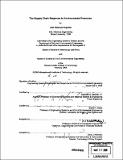The supply chain response to environmental pressures
Author(s)
Paquette, Julie Rebecca
DownloadFull printable version (8.423Mb)
Other Contributors
Massachusetts Institute of Technology. Dept. of Civil and Environmental Engineering.
Advisor
David H. Marks.
Terms of use
Metadata
Show full item recordAbstract
Understanding and shaping the relationship between supply chain management and the natural environment is critical not only to human health and the environment, but to the future success of business. While the cumulative environmental impacts of industrial production are best addressed at the supply chain level, little research has connected the overall context of supply chain management, including the characteristics of environmental pressures and market drivers, to a general approach for developing operational supply chain processes that may deliver environmental and economic performance improvements. Findings from a series of semi-structured interviews indicate that there are four sources of environmental pressure currently affecting supply chain management in unique ways. These include regulations, customer demands, resources, and ethical responsibility. Corporations that are better able to identify and understand these impacts will be better positioned to address them strategically. A framework of supply chain environmental excellence is presented to illustrate how corporations may integrate environmental operating models, operational objectives, and new supply chain processes into a comprehensive corporate strategy. (cont.) A case study of the emergence of reverse supply chains within the electronics industry illustrates why supply chain processes should be developed in a context defined by environmental pressures and market drivers. As the electronics industry is faced with environmental pressure from evolving regulatory directives, liability concerns, and social responsibility demands, leading companies are researching and piloting reverse processes to varying extents. Findings from a second series of industry interviews reveal a number of regulatory, behavioral, and economic trends and challenges that collectively shape both strategic considerations for individual corporations and the overall supply chain capabilities of the industry.
Description
Thesis (S.M.)--Massachusetts Institute of Technology, Engineering Systems Division, Technology and Policy Program; and, Thesis (S.M.)--Massachusetts Institute of Technology, Dept. of Civil and Environmental Engineering, 2006. Includes bibliographical references (p. 131-135).
Date issued
2006Department
Massachusetts Institute of Technology. Department of Civil and Environmental Engineering; Massachusetts Institute of Technology. Engineering Systems Division; Technology and Policy ProgramPublisher
Massachusetts Institute of Technology
Keywords
Technology and Policy Program., Civil and Environmental Engineering.